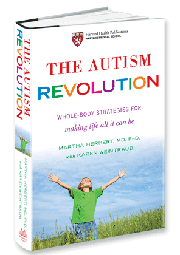The idea that autism can be attributed to “global crisis” needs to be unpacked by specifying
- What is meant by “global crisis”
- How such a “global crisis” could affect the brains and bodies of fetuses, infants and small children (and their parents and nursing mothers) to cause or contribute to autism
WHAT GLOBAL CRISIS
- FOOD: deterioration in food nutrient density from
- inputs that are nutrient-poor (e.g. chemical fertilizers) and lack of composting in so-called “conventional” farming practices
- food processing that removes nutrient components from food and replaces them with a few nutrients but not the vast range of micronutrients and phytonutrients in the original food sources (plants, animals)
- TOXINS: invention of at least 80-100,000 new to nature chemicals initially without safety testing and later with safety testing that looked for serious toxicity but not effects at the level of epigenetics, alteration of hormonal function, impact on immune system etc. (partly because these impacts were not measurable when this started)
- Impact on human, animal and plant physiology, on ocean health
- No non-toxic places on the planet at present
- INCREASE IN CHRONIC DISEASES: Obesity, diabetes, cancer, heart disease, autoimmune disease and much more have been rising steadily and now affect huge numbers of people. Research is starting to indicate that people with these kinds of problems may be at increased risk of having a child with autism. Underlying physiology has many similarities across these conditions — including autism.
- ECONOMIC CRISIS: Many facets of this but a pertinent part is the dependence of many people on jobs that involve the production and distribution of products that are bad for your health
- GLOBALIZATION AND STRESS: Family, cultural and agricultural structures that may have organized daily social, dietary nourishing traditions and other health related practices are being transformed and often replaced by practices that are more fragmented, and lead to health-compromising practices such as increased consumption of poor quality food and increased stress.
- INSTITUTIONALIZATION OF CARE: Turning over care to professionals carries the risk of impersonal attention and governance of care activities by economic considerations. It also can lead to fragmentation of care so that an integrated view of the person needing care is not maintained anywhere.
All of the above problems will make it difficult to have a coordinated approach to the full range of complexity of autism.
HOW GLOBAL CRISIS CAN IMPACT THE BODY AND BRAIN
- Genes: DNA damage, damage to DNA repair mechanisms, insufficient supply of nutrients needed to maintain DNA repair mechanisms
- Physiology: Oxidative stress, inflammation, perturbed metabolism, challenged cellular energy production can all be caused or worsened by poor food quality, toxic or other harmful exposures, or the perfect storm of lots of these in combination on top of degraded genetic integrity
- Brain: Neurons and glial cells in the brain can have compromised function from genetic and physiological alterations, which can lead to degradation of brain systems
- Regulation: The ability of cells, tissues, organs and systems to self-regulate can be degraded as genetic and physiological problems accumulate
- Stress: If stress is defined as having more demands than you (or your body or brain’s systems) can handle, then global crisis can take away sources of resilience and add demand, thereby increasing stress.
- Sensation, perceiving, thinking: All of the above problems can lead to overload of sensory systems with poor processing and coordination of information, feeding back to increase stress, strain physiology, and further degrade function at many levels.
This point of view, that global crisis “causes” autism, interfaces with the “transformational opportunity” idea of what autism “is” and with the “transformational practices” approach in the “how can we help” section, but more explicitly articulates some of the influences.
CRITICISM OF THE IDEA THAT GLOBAL CRISIS CAN CAUSE AUTISM
Critics of this point of view have general and specific arguments:
- General argument: That there are great benefits to globalization, to the cyber-revolution, to technical progress, and more, with striking improvements in health, longevity, literacy, civility etc.; and that the problems in the “crisis” formulation are overstatede.
- Specific argument: That autism is too specific of a syndrome to be caused by “everything.”
Responses to these arguments from the “global crisis can cause autism” point of view
- Response to general argument: a) that the benefits are not uniformly distributed, and b) that benefits and harm are not mutually exclusive
- Response to specific argument: A number of critical features of autism pathophysiology (e.g. oxidative stress, inflammation, mitochondrial dysfunction) and brain function (e.g. “underconnectivity”) could be outcomes of a great many upstream triggers. This response is an elaboration of the “emergent systems features” argument under “What Is Autism.”
Resolution of these differences without exquisite discipline in reflective discourse might be rather difficult. Discussion easily deteriorates to a food fight of factoids cherry-picked by each vantage point to suit pre-existing beliefs. The factoids are generally fragmentary, while the gestalt of each viewpoint goes far beyond the facts.
The difficulty is that policy and socio-cultural decisions that need to be made tend to be made on the basis of these underlying beliefs.
For reflection: How much are your answers to the three core questions of “What is Autism?”, “What Causes Autism?” and “How Can We Help?” conditioned by your beliefs and viewpoints at this global level?


